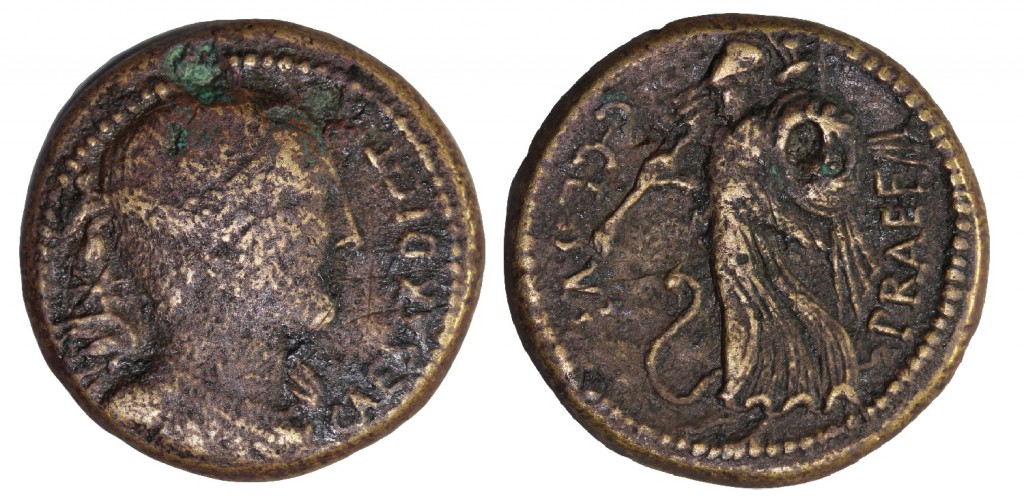July 13, 2015, by Will Leveritt
Happy Birthday Julius Caesar! Part II
Text by Mike Welbourn
Image © Mint Imperials
The date is not absolutely certain, and the year is subject to slight question but… happy birthday from us, nonetheless! To celebrate, we have a two-part blog entry today.
The first dealt with events up to the point when the first triumvirate disintegrated; this follow-up deals with events from then until Caesar’s death.

AE as or dupondius of Julius Caesar. Obverse shows winged Victoria right, CAESAR DIC TER. Reverse has Minerva l., snake in front, PRAEF C CLOVI. 12.97g.
But at this point, the situation began to unravel…
In 54 BC, Julia, Caesar’s daughter and Pompey’s wife died in childbirth, weakening one of the links that bound the triumvirs. Next in 53 BC, Crassus capped a disastrous campaign in the east by dying in battle, along with his son and the bulk of his legions.
With the triumvirate thus fractured, the optimate faction in the senate saw an opportunity to use Caesar’s military success, and the jealousy and rivalry it engendered, to turn Pompey against him and bring him over to their side. It was successful and in 50 BC, with Caesar’s governorship drawing to a close, the senate began demanding that he disband his legions and return to Rome as a private citizen.
Caesar, no doubt aware that his enemies intended to prosecute him for his actions as both consul and governor, had, while the triumvirate had still existed, organized the passage of a bill by all ten tribunes of the people entitling him to stand for a second consulship (of 49 BC) in absentia. Magistrates were immune from prosecution during their term and so he would have neutralized his enemies’ attacks. However, Pompey, now aligned with the senate, saw to it that this privilege was rescinded. Caesar’s reputation, position, and future were thus in jeopardy. The diplomatic overtures which Caesar made came to nought.
Left with no other options, he chose to defend himself with an invasion of Italy, crossing the Rubicon in January, 49 BC. Despite grand promises of raising his veterans to defend Rome, Pompey, his troops, and a large section of the senate fled to Greece. Caesar now controlled Rome and Italy, and over the course of the next four years he was obliged to secure his position by defeating his enemies in a series of battles across the Mediterranean: Pompey at Pharsalus in 48 BC, Cato and Metellus Scipio at Thapsus in 46 BC, and finally Pompey’s son, Gnaeus Pompeius, at Munda in 45 BC.
Left without rivals or enemies and in complete control of the Roman world, Caesar was made dictator for life in 44 BC. He was about to embark on a campaign of conquest (and revenge) against the Parthians, when he was assassinated by a group of disgruntled senators, led by Brutus and Cassius, who called themselves the liberatores, and saw in Caesar a tyrant. The conspirators murdered the dictator on 15 March (the Ides), 44 BC. He was 55 years old. The power vacuum this created was contested, initially between the conspirators and their supporters (who wished to restore the Republic) and the adherents of Caesar, led by Marc Antony and Caesar’s great-nephew, Octavian, who the dictator had adopted in his will.
In 42 BC the republicans were defeated at Philippi, and that same year Caesar was deified; he received a temple to the Divine Julius in the Forum and was enrolled amongst the pantheon of Roman gods. Over the following decade, the goal of sole rule of the empire, towards which Caesar’s dictatorship had pointed the way, was to be pursued by Marc Antony and Octavian who fought a civil war against each other for supremacy. The ultimate victor was of course Octavian, who went on to become Rome’s first emperor Augustus.
No comments yet, fill out a comment to be the first

Leave a Reply